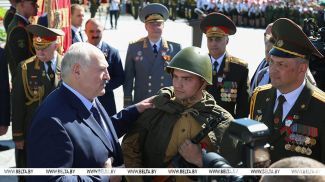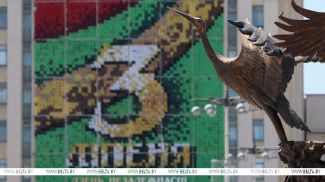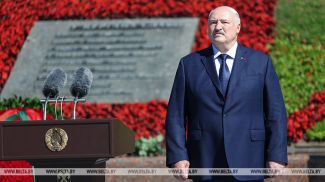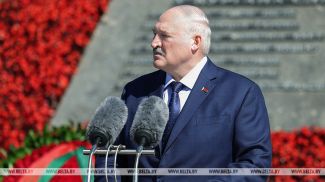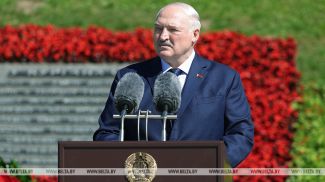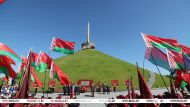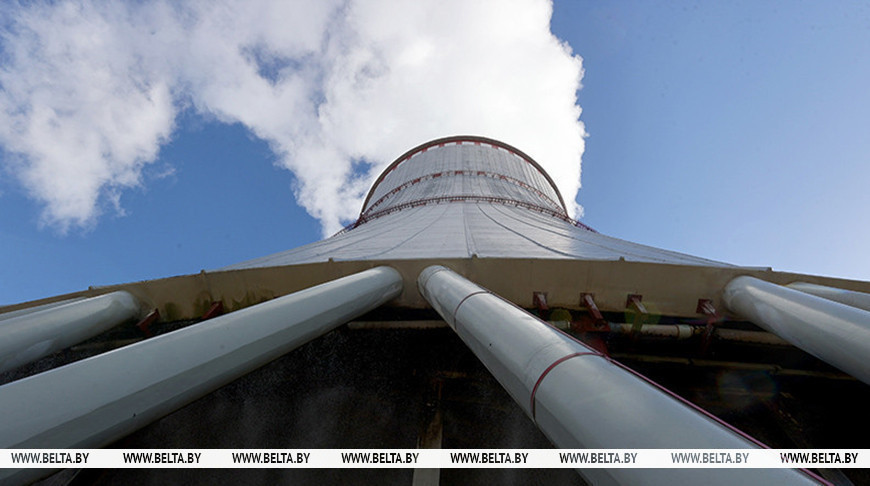
KOSTYUKOVICHI, 30 April (BelTA) – The Belarusian society has recovered from the post-Chernobyl syndrome, Belarusian President Aleksandr Lukashenko said as he talked to residents of the town of Kostyukovichi on 30 April, BelTA has learned.
"Probably, our society has recovered from the post-Chernobyl syndrome," the president said. He stressed that he was very worried when making the decision to build a nuclear power plant, taking into account the Chernobyl legacy. Belarus relied on Russia’s support and the international experience which it carefully studied, including with the assistance of the IAEA.
Speaking about the Chernobyl disaster, Aleksandr Lukashenko stated that anything can happen in life. The human factor played a role then.
"Anything can happen. But this does not mean that we should stop, do nothing and wait for happiness to fall from the sky. We took a chance. I took the risk, and you did too. Today we understand that we did the right thing. This is the cleanest type of energy," the head of state emphasized. “We built it not only to get electricity but to start a new school of expertise in Belarus. The construction and operation of the plant leads to education. Today we have our own specialists. And I wanted Belarusians to learn to do it."
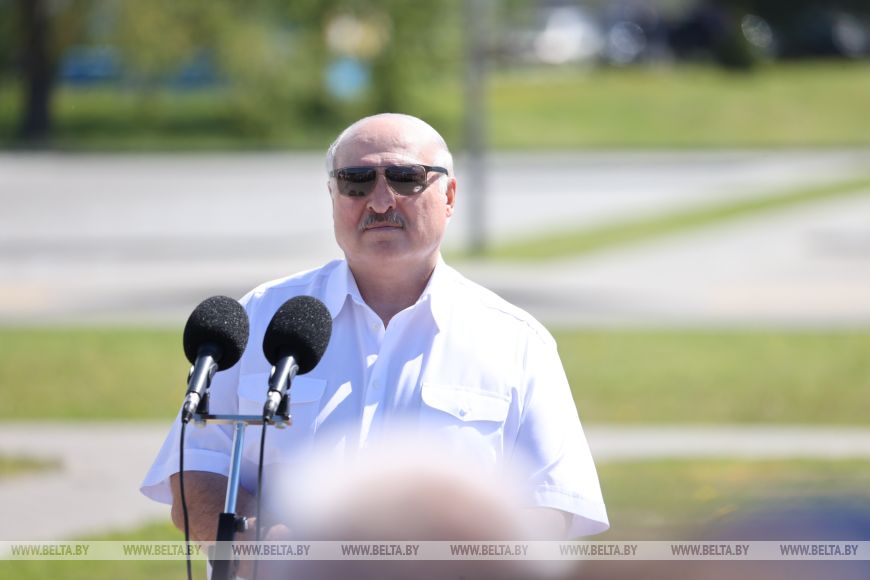
Now Belarusian specialists have the opportunity to work abroad on the construction of nuclear power plants. Belarus built more than a third of its first plant itself. The engineers and technologies were from Russia.
Aleksandr Lukashenko is confident that Belarus acted wisely by going ahead with the nuclear power plant project, despite all the criticism and pressure from Poland and Lithuania.
The president recalled that opponents at one time proposed to shut down the BelNPP, which was still under construction at the time. He, in turn, urged not to rush and see what the Western countries themselves were doing.
"Poland, which initiated this smear campaign against us, plans to build two nuclear power plants. Lithuania, having lost Ignalina... It was a normal plant, operational. Lithuania could maintain it in a proper condition and receive electricity. Today they buy it at crazy prices," the Belarusian leader said.
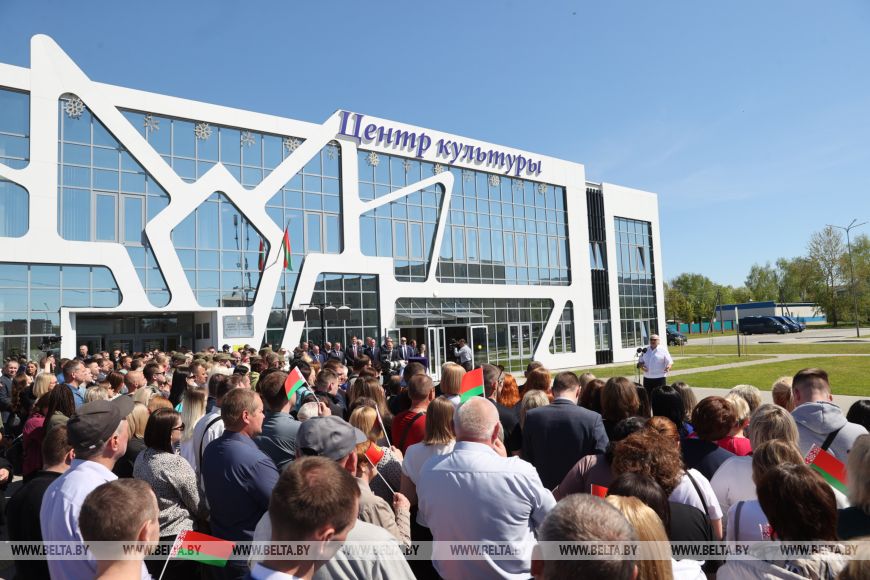
Other EU countries, which decided to shut down their nuclear power plants and reorient themselves towards wind power and other renewable sources, also suffered negative consequences, including in terms of energy prices.
According to the head of state, the construction of BelNPP had enabled the country to expand the use of electricity, including for the needs of transportation and home heating.
Aleksandr Lukashenko said that he started thinking about the possibility of building another plant, but the issue was still under consideration. The decision has not been made yet.
“The second site (the Krasnaya Polyana site was previously identified as an alternative to the Ostrovets site, where BelNPP was built) is located east of Mogilev. I am thinking about where we could place these reactors if we were to build the second NPP today,” the president said.
He explained that it would be cheaper to place two more reactors in Ostrovets but did not rule out that the new plant, if such a decision was taken, would be build in the east of the country: “I believe that now when we have a nuclear power plant in the west, we should build another one in the east of the country.” The residents of Kostyukovichi met these words with applause.
“I have not made a decision yet. We are mulling this over,” the head of state said. “We are comparing data, information. And, of course, we need money for this. We need to borrow it, take a loan, and repay it as we do for this station. We still have a lot of issues to consider. If I do not have time to do it in my political life, I would at least like to have an opportunity to start this project. You will complete it anyway.”
Aleksandr Lukashenko expressed confidence that the construction of the second nuclear power plant would be a serious step forward and compared it with the development of the space industry. According to the president, the flight of the first Belarusian cosmonaut was the pinnacle of Belarus' achievements and accumulated competencies in the space industry.
According to the head of state, the construction of BelNPP had enabled the country to expand the use of electricity, including for the needs of transportation and home heating.
Aleksandr Lukashenko said that he started thinking about the possibility of building another plant, but the issue was still under consideration. The decision has not been made yet.
“The second site (the Krasnaya Polyana site was previously identified as an alternative to the Ostrovets site, where BelNPP was built) is located east of Mogilev. I am thinking about where we could place these reactors if we were to build the second NPP today,” the president said.
He explained that it would be cheaper to place two more reactors in Ostrovets but did not rule out that the new plant, if such a decision was taken, would be build in the east of the country: “I believe that now when we have a nuclear power plant in the west, we should build another one in the east of the country.” The residents of Kostyukovichi met these words with applause.
“I have not made a decision yet. We are mulling this over,” the head of state said. “We are comparing data, information. And, of course, we need money for this. We need to borrow it, take a loan, and repay it as we do for this station. We still have a lot of issues to consider. If I do not have time to do it in my political life, I would at least like to have an opportunity to start this project. You will complete it anyway.”
Aleksandr Lukashenko expressed confidence that the construction of the second nuclear power plant would be a serious step forward and compared it with the development of the space industry. According to the president, the flight of the first Belarusian cosmonaut was the pinnacle of Belarus' achievements and accumulated competencies in the space industry.





